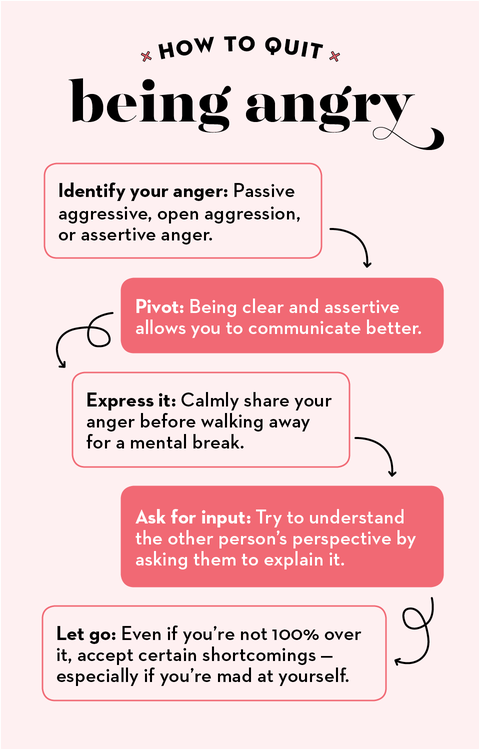How to Stop Being Angry

Angry. Furious. Livid. Majorly pissed off.
You know how it feels in your body when you’re good and mad — your heart races, your muscles tighten, you may feel short of breath. That’s the “fight or flight” reaction that rage is biologically designed to elicit, in order to protect us from danger, like someone coming at us swinging a baseball bat.
But in humans, anger is triggered by all sorts of situations that aren’t literally a threat to our physical safety, including when we feel frustration or impatience at being made to wait on hold forever, for instance, being betrayed by someone we trusted — or even politics.
It doesn’t feel good to be angry, and many people (especially women) think you need to figure out how to completely stop being angry. And it’s true that the long-term effects of anger on the body aren’t great — they can include headaches, anxiety, digestion problems, high blood pressure and more.
But not only is it impossible to completely prevent yourself from having this natural emotional response, anger isn’t always bad, say experts. The trick is to manage that feeling and control how you act on it.
What is the root of anger?
“There are two things that almost always underlie anger,” says Ellen Astrachan-Fletcher, Ph.D., regional clinical director with Pathlight Mood and Anxiety Center. “Feeling threatened in some way or having judgment about the situation or person you feel threatened by.”
When our anger bubbles up, it gets expressed in three ways: passive-aggressively, with open aggression and by being assertive. With passive-aggressive anger, you show how annoyed you are indirectly — by, say, “forgetting” to reply to emails or talking behind somebody’s back. Open aggression is exactly what it sounds like: You have outbursts or other visible displays of anger, like bullying or confrontations or fights. Neither of these are the best way to make your feelings known, and rather than get you closer to what you want (to be understood and to have your anger addressed) they can instead damage relationships, Astrachan-Fletcher says.
The healthiest, most productive type of anger is assertive anger, experts say.
“Assertive responses involve direct communication about feelings and desired outcomes that is appropriate for the context,” says psychology assistant teaching professor and director of the Syracuse University Psychological Services Center, Afton Kapuscinski, Ph.D. “You do it in a manner that involves self-control, with respect for others involved in the conflict. Assertive communication has the best chance of preserving relationships and achieving desired aims,” such as changing the situation or simply being heard.
Why do I get so angry so easily?
The reason anger might flare up like a match strike is because of how you perceive what happened: When you feel threatened (even if not physically) or feel you’re being judged, you’re thrown into survival mode — and that brings about angry feelings. It can happen almost instantaneously, too, especially when what’s winding your watch is something that makes you want to react with passive or open aggression.
Imagine your partner accuses you of cheating on them, when you have always been faithful and gone out of your way to show how much you love them. This feels unfair, and perhaps makes you feel like who you are is being called into question. “We may become angry almost automatically at times when we are threatened or experience injustices in our lives,” Kapuscinski said.
And though it’s often interpreted as a “bad” emotion to have, anger can actually be pretty helpful and healing, provided you know to calm down, navigate the situation well and express your feelings in an assertive, not aggressive or passive-aggressive way.
How can I express my anger productively?
If someone has upset or hurt you, and you feel like reacting with passive or overt aggression, the first thing you’ll want to do is take a break. Tell the person that you’re upset and you need some space to think things through, advises Astrachan-Fletcher. You’ll stand a much better chance of a positive outcome — which will lead to your being able to release any angry feelings — if you don’t come at the situation with a full head of steam.
Then actually do it, too—use that time to calm down and try to identify what triggered you. If it helps, Charmain F. Jackman, Ph.D., founder and CEO of InnoPsych, Inc., an organization working to increase access to therapy for people of color, suggests splashing some cold water on your face and scheduling a time to come back to the conversation. Meanwhile, try exercise or journaling to release your anger in a healthy way.
When it’s time to come back to the conversation, this is when you whip out your assertive anger and become and strong and clear advocate for yourself.
Express what upset you about what went down, state what your needs are in the situation and make sure they’re understood. But also try to understand the other person’s point of view, says Astrachan Fletcher. When we’re angry, we sometimes don’t see things clearly and assume we know what’s going on with the other person. Kapuscinski says it’s because “our appraisal of the situation becomes based on cues from the intense physical aspects of anger we are experiencing” and “we are wired to narrow our attention on the perceived threat and act quickly without taking the time to fully utilize the parts of our brains responsible for planning and judgment.” So resist the urge to make assumptions about how they’re feeling and why; instead, ask them to explain it. Eventually, you should be able to get to a place where you can compromise on a solution.
This will be even more possible if you don’t assume the other person is coming from a place of anger — the other person might be adamant or have a very direct style, but not be angry themselves. “It’s easy to misjudge facial expressions, body language and tone of voice,” Jackman says. “This is especially a concern for people of color, who are often identified as angry when they are not. Therefore, it is important to check on how people are feeling before making assumptions that they are angry.”
Plus, if you go into a conversation assuming the other person will react poorly, you’ll automatically be on the defensive, Kapuscinski says — which will make you less receptive to a discussion or compromise.
How can I let go of my anger?
In most cases, letting go of your anger is the healthiest choice; not just for the sake of your relationships, but also for your own mental health. You’ll always face situations that make you angry and ones that you can’t control. Ditching the anger will give you a better perspective and ease the stress on your mental and physical health.
If you and the other person can’t come to an accord, though, you need to find some level of acceptance — otherwise, you could become bitter or start to resent that person, especially if you think you’re in the right. And that’s just as bad for you as being angry. “Remember,” says Astrachan-Fletcher, “resentment is like taking poison and waiting for the other person to die.”
Keep in mind, though, that accepting the situation or outcome of an argument doesn’t mean you’re happy with it. It’s more about accepting what’s happened, understanding the new situation and then figuring out ways to problem solve.
“When anger about situations where the person has limited control is all-consuming or causes the person to have difficulty functioning, acceptance can be empowering and freeing,” Kapuscinski says. “However, anger itself can be empowering in the same situations when channeled well. Consider issues of civil rights, for example, and how unrest with injustice may help people and groups to find ways of making constructive changes.”
The bottom line? Even if you feel justified in your anger, you’re in charge of what happens on a personal level. “We are each responsible for all of our feelings, including anger and how we choose to express it,” Jackman says.
How can I stop being angry at myself?
Sometimes the most intense and long-standing anger is directed toward ourselves. Maybe you screwed up and did something outside your value system, like lying or cheating, or maybe you just missed an important deadline. Or maybe you’ve been raised to think you have to be perfect in certain ways, and get mad at yourself when you’re simply human. Suddenly, you’re beating yourself up for falling short. Jackman and Kapuscinski want you to do one thing in this situation: Exercise some self-compassion.
“We can have harsh inner critics or hold ourselves to unrealistic expectations,” Jackman says. “Self-compassion allows you space to make mistakes and to let go of destructive or negative feelings and experiences.”
So how do you exercise self-compassion? Basically, you treat yourself as you would treat a child or a close friend who messed up or is being too hard on themselves. Cut yourself a break, forgive yourself and see what you can learn from the situation, says Astrachan-Fletcher.
Forgiveness is one of the most important parts of the equation, because self-flagellation doesn’t usually result in our doing it better next time — even though we’re beating ourselves up with the hope that it will actually help us do just that. “The problem is that when we beat ourselves up, our self-anger only keeps us stuck,” she said. “Because being angry at ourselves and beating ourselves up is intermittently reinforced [or] only gets rewarded very infrequently, like gambling, it becomes the hardest kind of habit to break because we are always striving for that reward, or in this case behavioral change.”
If you forgive yourself, however, you can move on. Astrachan-Fletcher suggests sharing with people who care about why you’re angry at yourself. Their supportive responses could help reduce any shame you’re feeling.
Do I have anger issues?
Anger can be a healthy emotion, because handled constructively, it can show us what needs to change and help us take action. But if it gets too intense, you’re always angry (even without reason) and blowing up at people, or acting in violence against others or yourself, it might be time to talk to a professional. Remember: There’s nothing wrong with seeking help to regulate anger.
Doing so will not just help your relationships. “Anger issues can be connected to addiction issues, depression, bipolar disorder, anxiety and other mental health issues,” Astrachan-Fletcher said. “In this case, seeking mental health treatment can be most helpful.”
This content is created and maintained by a third party, and imported onto this page to help users provide their email addresses. You may be able to find more information about this and similar content at piano.io
Source link







